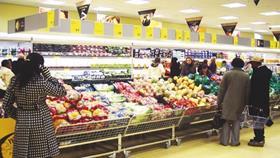
British consumers are more optimistic than they have been since March 2005 in line with ongoing economic recovery, a consumer confidence analyst has said.
Marketing specialist GfK’s monthly UK Consumer Confidence Index moved from 0 to 1 for the first time in nine years. The Index score is calculated using five measures, including confidence in personal finance, general economic situation, savings and major purchases.
“An unspectacular change this month, but a psychologically important one, in that the Index has moved into positive territory for the first time since March 2005,” said Nick Moon, GfK managing director of social research.
“The next few months will be particularly interesting, since the previous venture into positive territory was merely transitory – two isolated months in January and March 2005. The last time the Index was consistently positive was back in 2002 and this must be the next “target” from the government’s point of view as we get close to the election period.”
Consumers feel more confident in the general economic situation of the country, but there is a slight drop in their confidence in personal finances in the next year, although this is still expected to stay higher than 2013 figures, GfK said.
The news comes as grocery market growth regained momentum by rising to 2.8 per cent, up from last period’s record low of 1.7 per cent, according to figures from Kantar Worldpanel for the 12 weeks ending 22 June.
Last week the Office of National Statistics revealed that GDP grew by 0.8 per cent in the first three months of the year, indicating a 'balanced' economic recovery and which has been boosted by the fastest growth in business investment in two years.
“Aldi and Lidl continue their stellar growth streaks, holding their all-time record shares reached last period of 4.7 per cent and 3.6 per cent respectively,” said Fraser McKevitt, consumer insight consultant at Kantar Worldpanel. “Both retailers have recently announced impressive expansion plans. Aldi will aim to double its store numbers to 1,000 by 2021, while Lidl is seeking to boost its presence with an eventual total of 1,500 outlets.”
McKevitt said growth among the top four is mixed, with Tesco and Morrisons posting falls in sales and share but Asda and Sainsbury’s increasing share and beating average market growth by 3.6 per cent and 3.0 per cent respectively.



